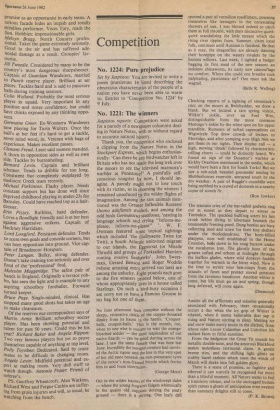No. 1221: The winners
Jaspistos reports: Competitors were asked for a parody of a newspaper columnist deal- ing in Nature Notes, with or without regard to accurate natural history.
Thank you, the competitor who enclosed a clipping from the Nature Notes in the Stockport Express, which begins enthusias- tically: 'Can there be any birdwatcher left in Britain who has not made the long trek over the moors to see the televised marmora's warbler at Penistone?' A painfully self- conscious songster by now, I should im- agine. A parody ought not to lose touch with its victim, so in choosing the winners I remained unseduced by the wilder flights of imagination. Among the rare animals men- tioned was the Greater Inflexible Rosterer (homo aslefiensis avidus), and among the odd birds Germ anicus studiosus, 'nesting in language schools and crying "Inform-me- please, inform-me-please" '. W. F. Owtram featured some topical sightings which included 'the Guiltyaerie Twite (or Twit), a South Atlantic uninvited migrant to our islands, the Eggsorset (or Missile Thrush) and groups of Forktailed Harriers routing evasive Seahawks'. John Sweet- man, Gerard Benson and Roger Woddis (whose amusing entry arrived too late) are among the unlucky. Eight pounds each goes to the five winners printed below, one of whom appropriately lives in a house called Starlings. On such a bird-busy occasion I am sorry not to have a Famous Grouse in my bag for one of them.
No June afternoon feels complete without the sleepy, reiterative tinkle of the copper-throated dimity from its haunt in the hazels: 'Croquet- balls, croquet-balls.' This is the month, too, when to one who is content to wait the orange- blotched nidder — the most resplendent of our native lizards — can be spied darting across the lane. I saw the same female that was here last June. Incredibly the intrepid creature had surviv- ed the Arctic rigour and the loss in this very spot of her old mate beneath the non-pneumatic tyres of the rector's iron-framed bicycle which ferries. him to and from interments.
(George Moor) Out in the wilder haunts of the windswept dales — where the young frogwort fidgets whimsically in the quaint old coppices dotting the peaty ground — there is a stirring. One leafy dell
sported a pair of vermilion toadfishers, preening themselves like teenagers in the coruscating showers of sun. I was blessed indeed to catch them at full throttle, with their distinctive quirk- quirk scandalising the little stream which the rising river tipples from. Summer, claim local folk, continues until Autumn is finished. Be that as it may, the dragonflies are already dancing their hornpipe on the watery rivulets by the lissome willows. Last week, I sighted a badger bagging its first meal of the new season: an indolent chinaworm, its natty new camouflage no comfort. Where else could one breathe such palpitating, passionate air? One must ask the wagtail.
(Belle R. Welling) Checking reports of a sighting of temminck's stint on the moors at Bwlchyddar, we drew a blank. But we located a rare spring visitor, Wilkin's siskin, over on Foel Wen, distinguishable from the more common Montagu's siskin by the white spot on his upper mandible. Rumours of tufted capercailzies on Wigtwizzle Top drew crowds of birders to Morridge, and after yomping over High Neb we got them in our sights. Their display call — a high, mewing `dreek' followed by characteristic. trilling churrs — could be distinctly heard. We found no sign of the Dossetor's warbler at Kirkby Overblow mentioned in the media, which would have been a first for South Yorks! But we saw a sub-adult bearded goosander nesting by 13lubberhouses reservoir, attracted south by the dry weather. A pair of Ruggle's crossbills were being mobbed by a crowd of dotterels in a nearby copse of scotch fir.
(Ron Jowker) The staccato cries of the bar-tailed godwits ring out at sunset as they depart to winter in Timbuktu. The speckled bullfrog utters his last croak before diving to hibernate beneath the imminently freezing pond. Dung beetles are busy collecting mud and straw for their tiny shelters under the rhododendrons. The horn-billed platypus, now well established in the Home Counties, beds down in his snug burrow under the eucalyptus tree. The ghostly hoot of the greater tufted owl echoes at midnight through the leafless glades, where wild donkeys huddle together for warmth in the bitter wind. Now is the time to secure your hen-coops from the assaults of foxes and protect stored potatoes from the ravenous bandicoot. Another winter is come, but life must go on and spring, though long deferred, will come again.
(Desmond) Amidst all the afflictions and miseries generally associated with February, there occasionally occurs a day when the icy grip of Winter is relaxed, when it seems believable that sap is rising and Nature stirring in sleep. Melting ice and snow make merry music in the ditches, from whose sides Lesser Celandine and Coltsfoot lift radiant faces to fitful sunshine.
From the hedgerow the Great Tit sounds his metallic double-note, and the amorous Blackbird makes melodious territorial claim. A gentle breeze stirs, and the shifting light glints on stubby hazel catkins which soon the winds of March will shake into full golden glory.
There is a sense of promise, so fugitive and ethereal it can scarcely be recognised for more than a blissful moment. All Nature seems to feel a transitory release, and to the unclogged human spirit comes a gleam of anticipation even sweeter than summery delights still to come.
(P. K. Brown)






















































 Previous page
Previous page